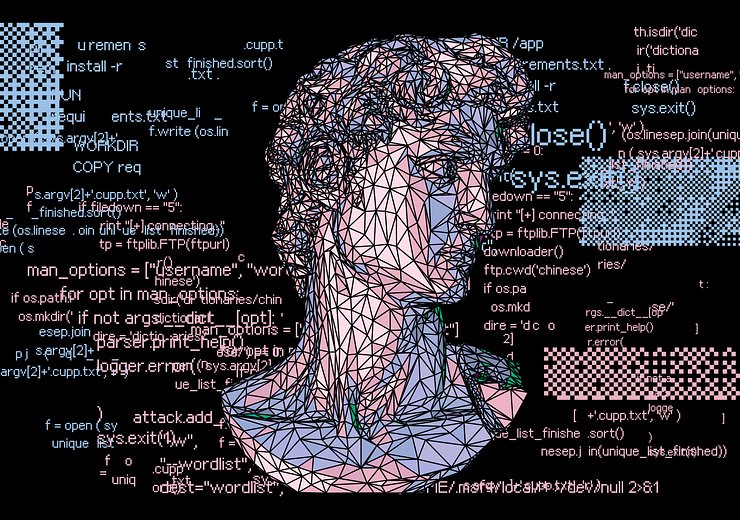Artificial Intelligence
ChatGPT has turned our world upside down, but there are many more domains where AI is rapidly gaining traction. Stay up-to-date on all latest news, projects and events when it comes to AI.

Artificial Intelligence (AI) offers vast opportunities for our society: more efficient and personalized services, better decision-making in various fields, and advancements in medicine and science. However, critical challenges in privacy, ethics, and transparency need to be addressed to ensure that AI systems are not discriminatory or unpredictable. Additionally, sustainability poses a future challenge, as the energy consumption of AI systems is significant.
TU Wien Informatics is at the forefront of advancements in AI, addressing challenges and developing ethical, human-centered and environmentally sustainable AI systems. Our research focuses on a diverse range of approaches, and the recently established Cluster of Excellence Bilateral AI leverages the potential of combining symbolic (Knowledge Representation and Reasoning) and sub-symbolic (Machine Learning) AI. The combination of symbolic and sub-symbolic AI opens up new avenues for AI that are better at solving problems, adapting to a wide variety of environments, having better reasoning skills, and being more efficient in terms of both computation and data use. These key features allow for a vast range of use cases, starting with drug development and medicine, over planning and scheduling, to autonomous traffic management and recommendation systems. With fairness, transparency, and explainability as top priorities, developing next generation AI systems is also essential for addressing ethical concerns and ensuring a positive impact on our society.
Highlights
Missed something? Scroll down to see all our recent highlights, events, and news.
Our Mission
Artificial Intelligence relies on a wide range of methods - from logics, deep learning, and knowledge representation to large language models. It is essential to understand these different approaches to be at the forefront of the development of next-generation AI systems. These systems require a combination of methods to provide robust, transparent, and fair results. With strong roots in both Symbolic AI and Machine Learning and a reflexive stance on the impact we have on society, TU Wien Informatics provides the perfect environment for this endeavor.
We are actively engaged in many research projects and collaborations that explore the opportunities and challenges presented by AI. Our faculty works both within and beyond the field to foster and facilitate research and collaborations that benefit all of society. We are convinced that ethical considerations are crucial to the development of AI, and must be integrated from day one. Our researchers are developing and embedding ethical frameworks into AI to build fair and trustworthy AI systems.
Our research extends across various disciplines, emphasizing the importance of diversity in both the people who conduct research and the methods they use. The recently established Cluster of Excellence, Bilateral AI (BILAI), brings together two main approaches in AI, symbolic and sub-symbolic AI, with the goal to create a Broad AI that is capable of addressing diverse tasks across multiple domains. The Center for Artificial Intelligence and Machine Learning (CAIML) and the the Christian-Doppler Laboratories are at the forefront of AI and Machine Learning research, leading efforts to strengthen both in their foundations and applications. Through the Digital Humanism Initiative, we strive for an inclusive, participatory development of technologies that benefit us all. To ensure a positive impact of AI in all domains, we need robust, trustworthy, explainable, but also sustainable AI systems. If you want to learn more about Sustainability in AI, you can read about current projects, updates, and news here.
Our faculty’s involvement with AI spans a wide range—from theoretical, formal, and ethical approaches to developing secure AI systems that are deployed in medicine, research, industry, and our everyday lives. If you want to learn more about our research projects, have a look at our Research Units; you’re sure to find some interesting projects, topics, and people!
Research
Bilateral AI
BILAI unites leading AI experts from TU Wien, JKU Linz, WU Wien, TU Graz, Universität Klagenfurt, and ISTA. The goal is to develop a Broad Artificial Intelligence (AI) that brings two approaches in the field of AI together: symbolic AI and sub-symbolic AI. By combining sub-symbolic AI (Machine Learning) with symbolic AI (Knowledge Representation and Reasoning), Bilateral AI provides the means to develop the foundations of a new level of AI with broader capabilities for skill acquisition and problem-solving: Broad AI.
Center for AI and Machine Learning
Headed by Stefan Woltran and Clemens Heitzinger, the Center for Artificial Intelligence and Machine Learning (CAIML) strives to consolidate and enhance research endeavors in both Artificial Intelligence and Machine Learning. Encompassing both fundamental principles as well as real-world implementations, its goal is to position TU Wien as a beacon of excellence in the field. By fostering interdisciplinary collaboration, it propels breakthroughs at the crossroads of AI and ML.
Center for Logic and Algorithms
Headed by Stefan Szeider and Agata Ciabattoni, the Vienna Center for Logic and Algorithms (VCLA) is promoting international scientific collaboration in logic and algorithms.Its outreach activities are aimed towards raising aspirations of young people for academic pursuits and to raise awareness on the impact of the research done in the areas of logic, philosophy, mathematics, computer science, and artificial intelligence among the general public.
CDL AI and Optimization for Planning and Scheduling
Headed by Nysret Musliu, the project develops innovative problem-solving techniques based on the synergy of AI and optimization. These methods use machine learning for automatic selection, configuration and design of algorithms. New strategies based on the hybridization of methods from both fields are proposed.
CDL Recommender Systems
Headed by Julia Neidhardt, the project develops methods to model and predict the behavior of various interrelated outcome dimensions (accuracy, diversity, novelty, and serendipity) and biases, taking into account different domains and a multi-level view of users (individual, group, and network levels).
Joint Human-Machine Data Exploration
We integrate interactive ML and interactive visualization to learn about data and from data in a joint fashion. To this end, we propose a data-agnostic joint human-machine data exploration (JDE) framework that supports users in the exploratory analysis and the discovery of meaningful structures in the data.
Scalable Reasoning in Knowledge Graphs
Headed by Emanuel Sallinger, the project aims to develop the theoretical and practical foundations for scalable reasoning in knowledge graphs. To this end, new methods and algorithms are designed that combine the best methodologies and techniques from the database and Knowledge Representation and Reasoning areas with those of selected other fields.
Towards Trustworthy Recommendation Systems for Online Social Networks
Headed by Stefan Neumann, the project aims to understand the impact of recommender systems in social networks before they are deployed. This is arguably one of the most important challenges in the area of social network analysis, with the goal of minimizing negative societal effects and contributing to the effective regulation of social media algorithms.
Visual Analytics and Computer Vision Meet Cultural Heritage
Visual media such as historical photographs and amateur films are important components of the media collections created by digitization. To capture the contents of these collections and gain new insights, it takes methods that combine efficient automated data analysis with the expertise of specialists. We explore approaches to automatic image analysis and visualization to access historical media collections and make them accessible to a wide range of users.
Education
We are dedicated to excellence in our research activities, but we are equally dedicated to excellence when it comes to teaching and education.
We are at the forefront of mastering complex societal challenges with our research and education in AI. What sets us apart? Academic excellence! Our vision: To create a space where people can thrive, and their curiosity can become cutting-edge research. Beyond our dedication to excellence, our research and education efforts go hand in hand with a strong commitment to society. At TU Wien Informatics, you’ll learn from the best and are integrated into an international research community, and a good balance between teachers and students helps you to reach your full potential.
- Bachelor Informatics
Specialize in Artificial Intelligence and Machine Learning right from the start. - Master Logic and Computation
Formal methods in this field build the basis for tackling challenges in AI. - Double Degree Logic and Computation
Learn all about formal methods, the basics of AI, in Leibnitz and Vienna. - Master Data Science
Understanding interrelationships and patterns from data is key in AI research. - TU Wien Informatics Doctoral School
Our Doctoral Schools offer many opportunities to shape the field of AI.
Contact
Want to get to know the people behind our research? Here are the leading experts and primary contacts for our efforts in AI in alphabetical order:


Nysret Musliu N. Musliu
CDL AI and Optimization for Planning and Scheduling

Stefan Neumann S. Neumann
WWTF Towards Traustworthy Recommendation Systems for Online Social Networks

Emanuel Sallinger E. Sallinger
WWTF Scalable Reasoning in Knowledge Graphs
News and Events
Recent highlights, events, and news from all our efforts in AI.
Want more? Head over to our
Newsroom!
Experts in the Media
Here you’ll find the latest media coverage with our AI experts:
June 2025
- Sabine Theresia Köszegi / „Wir verkaufen uns und lassen uns steuern“ / krone.tv / Wiener Wissen / Jun 16, 2025
- Gerti Kappel / Arbeitslos durch KI / Ö1 / Digital.Leben / Jun 12, 2025
- Gerti Kappel / Über wieviel digitale Kompetenz verfügen wir? / Ö1 / Science Arena / Jun 2, 2025
May 2025
- Walter Palmetshofer / KI im Alltag: Zwischen Hilfe und Risiko / ORF.at / May 31, 2025
- Hannes Werthner / Digitaler Humanismus von KI gefordert / ORF.at / May 27, 2025
- Hannes Werthner / Gerechtigkeit und Grundrechte – Konferenz zum Digitalen Humanismus / OTS and ORF kulturMontag / May 26, 2025
- Sabine Andergassen / Neues Masterstudium QIST / OTS / May 21, 2025
- Sabine Andergassen / Neues Masterstudium: Quantentechnologie / Ö1 / Frühjournal / May 20, 2025
- Peter Knees / „Wir müssen weg vom isolierten Silo-Denken“ / krone.tv / Wiener Wissen / May 4, 2025
April 2025
- Gerti Kappel / Häupl ganz offen: „Bieten Forschern, die vor Trump fliehen, Asyl an“ / krone.tv / Wiener Wissen / Apr 20, 2025
- Erich Prem / DIGITALISIERUNG: So werden wir nicht überrollt / krone.tv / Wiener Wissen / Apr 7, 2025
- Ivona Brandic / Wissenschaftsministerin Holzleitner gratuliert: Ivona Brandić ist die 500. Wissenschaftsbotschafterin / OTS / Apr 3, 2025
March 2025
- Sabine Andergassen / Ein Quantum Mut zur Lücke / Die Presse / Mar 28, 2025
- Julia Neidhardt / Immer mehr Firmen setzen auf Chatbots / ORF ZIB Magazin / Mar 21, 2025
February 2025
- Cluster of Excellence BiLAI / KI made in Austria: FWF Cluster “Bilateral AI” unter der Leitung der JKU nimmt Arbeit auf / APA / Feb 27, 2025
- Cluster of Excellence BiLAI / Neues “breites” KI-Modell soll ChatGPT und Co. deutlich übertrumpfen / APA / Feb 26, 2025
January 2025
- Stefan Neumann / Panik um chinesische KI: “Völliger Blödsinn” / Kurier / Jan 28, 2025
- Margrit Gelautz / Gefühlvolle Autos für mehr Sicherheit im Straßenverkehr / ORF Mayrs Magazin - Wissen für alle / Jan 10, 2025
December 2024
- Jakob Fahringer, Ivona Brandic / Neuartige AKWs sollen KI-Stromhunger stillen / ORF Topos / Dec 20, 2024
- Stefan Neumann / Modell-Kollaps - Warum KI-Sprachmodelle an ihre Grenzen stoßen / Ö1 Digital.Leben / Dec 16, 2024
- Stefan Neumann / Wettrennen um KI - Der Hype um Künstliche Intelligenz / Ö1 Matrix / Dec 13, 2024
- Stefan Woltran, Julia Neidhardt / Warum der Chatbot wie ein Mann „denkt“ / Wiener Zeitung / Dec 2, 2024
October 2024
- Clemens Heitzinger / Kongress zu KI im Krankenhausbetrieb / Öberösterreich Heute / Oct 23, 2024
- Laura Kovacs, Martina Landman, Lukas Lehner / Tanzen im Algorithmus: Wie man Kindern Informatik beibringt / Der Standard / Oct 19, 2024
- Hannes Kaufmann, Clemens Heitzinger, Soroosh Dini-Mortezapoor / Who’s afraid of Artificial Intelligence? / Euronews / Oct 4, 2024
- Peter Knees / KI-Experimente fordern “weiße” Musik heraus / ORF TOPOS / Oct 4, 2024
September 2024
- Katja Hose / Graph Data - Visualization - Academic Pace - Illusions of Progress / Bonded by Science / Youtube / Sep 30, 2024
- Stefan Woltran / KI-Zukunft sollte nicht in der Hand von sieben Männern liegen / Der Standard / Sep 20, 2024
- Stefan Woltran / KI als Revolution für die Forschung? Wohl eher ein sehr mächtiges Werkzeug / Die Presse / Sep 13, 2024
- Stefan Woltran / Nachhilfestunden für KI / Profil / Sep 12, 2024
July 2024
- Ivona Brandic, Radu Grosu, Clemens Heitzinger / Eigene Daten als “Achillesferse” der KI / ORF TOPOS / Jul 30, 2024
- Radu Grosu, Zahra Babaiee, Peyman Mohseni Kiasari / Sehen Maschinen so wie Menschen? / Die Presse / Jul 1, 2024
June 2024
- Peter Knees / Profit von Tech-Konzernen zurückholen / Kurier / Jun 28, 2024
- Clemens Heitzinger, Felix Wagner / Das empfindlichste Experiment der Welt wird von KI gesteuert / TU Wien / Jun 19, 2024
- Matteo Maffei / Die Chatkontrolle ist ein Sicherheitsrisiko für ganz Europa / Der Standard / Jun 19, 2024
- Daniela Rus / Intelligente Roboter werden uns Superkräfte verleihen / Der Standard / Jun 9, 2024
May 2024
- Daniela Rus / Wie intelligente Roboter den Alltag verändern könnten / Ö1 Mittagsjournal / May 28, 2024
- Daniela Rus / Künstlich intelligente Roboter / Ö1 Digital.Leben / May 28, 2024
- Thomas Gärtner / Training für KI als Schlüsselfrage / ORF TOPOS / May 3, 2024
April 2024
- Clemens Heitzinger / Wie KI jedem Krebspatienten helfen wird / Kronen Zeitung / Apr 24, 2024
- Stefan Szeider / Wird alles berechenbar? / Ö1, Matrix / Apr 5, 2024
February 2024
- Clemens Heitzinger / Gesund mit KI? / APA Science / Feb 1, 2024
- Clemens Heitzinger / Wie KI die medizinische Diagnose und Therapie verbessert / APA Science / Feb 1, 2024
- Clemens Heitzinger / Was in vielen Labors und Kliniken schon Alltag ist / APA Science / Feb 1, 2024
January 2024
- Peter Knees / Gefährdet KI unsere Demokratie? / Digital.Leben Ö1 / Jan 18, 2024
December 2023
- Clemens Heitzinger / Doktor Digital: Einsatzmöglichkeiten Künstlicher Intelligenz in der Medizin / Ö1 Radiodoktor – Das Ö1 Gesundheitsmagazin / Dec 20, 2023
November 2023
- Clemens Heitzinger / Algorithmus statt Arzt? Künstliche Intelligenz in der Medizin / Ö1 Journal Panorama / Nov 28, 2023
- Emanuel Sallinger / KI-Technologie: Damit Mist kein Unrat wird / Kurier / Nov 23, 2023
- Agata Ciabattoni / Künstliche Intelligenz: Ethikunterricht für KI-Systeme / Kurier / Nov 22, 2023
- Peter Knees / KI und Menschenrechte / dimensionen.diskussionen Ö1 / Nov 16, 2023
- Georg Gottlob / Künstliche Ignoranz / Digital.Leben Ö1 / Nov 7, 2023
October 2023
- Julia Neidhardt / Künstliche Intelligenz: Der gefilterte Blick auf die Welt / Kronen Zeitung / Oct 20, 2023
- Clemens Heitzinger / Doktor Digital / News (40/2023) / Oct 6, 2023
September 2023
- Lukas Grasmann, Nysret Musliu / Künstliche Intelligenz weiß, was du morgen einkaufen willst / Kurier, Futurezone / Sep 11, 2023
August 2023
- Peter Knees / Der Kampf gegen die digitale Ohnmacht / Die Presse / Aug 27, 2023
- Georg Gottlob / Man muss es nicht künstlich intelligent nennen / ORF.at / Aug 27, 2023
July 2023
- Nysret Musliu / Wie Künstliche Intelligenz die Ressourcenplanung verbessern kann / Kurier, Futurezone / Jul 30, 2023
- Clemens Heitzinger / KI beantwortet medizinische Fragen / ORF.at / Jul 13, 2023
- Clemens Heitzinger / Künstliche Intelligenz berät bei Blutvergiftungen / Der Standard / Jul 7, 2023
- Stefan Woltran / Warum arbeitet KI nicht für mich? / Wiener Zeitung / Jul 1, 2023
June 2023
- Ivona Brandic / Künstliche Intelligenz: Grüner Datenstrom / Die Furche / Jun 22, 2023
- Thomas Eiter / Verschläft Politik die KI-Revolution / Café Puls, Puls 4 / Jun 19, 2023
- Clemens Heitzinger, Ivona Brandic / KI-Forschung um die Wette / Mayrs Magazin – Wissen für alle, ORF / Jun 16, 2023
- Clemens Heitzinger / KI, sagt der Hausverstand / Wiener Zeitung / Jun 6, 2023
- Clemens Heitzinger / Ein Punkt Belohnung für die KI, wenn der Patient überlebt / Kurier, Futurezone / Jun 5, 2023
- Clemens Heitzinger / Künstliche Intelligenz als Lebensretter / Kurier / Jun 5, 2023
May 2023
- Clemens Heitzinger / Bessere Diagnosen durch KI in der Medizin / Ö1 Journal um acht / May 22, 2023
- Julia Neidhardt / Made by KI: Wie Künstliche Intelligenz die Mode- und Beautyindustrie verändert / MISS / May 19, 2023
- Ivona Brandic / Extremer Energiehunger von KI und IT: Was wir tun können / Kurier, Futurezone / May 19, 2023
- Peter Knees, Julia Neidhardt / UNESCO-Lehrstuhl für “Digitalen Humanismus” an TU Wien eingerichtet / Salzburger Nachrichten / May 16, 2023
- Peter Knees, Julia Neidhardt / “Digitaler Humanismus” – UNESCO-Lehrstuhl an TU Wien eingerichtet / APA Science / May 16, 2023
- Clemens Heitzinger / KI erstellt Behandlungspläne für Blutvergiftung / ORF.at / May 11, 2023
April 2023
- Julia Neidhardt / Wie Künstliche Intelligenz für “glückliche Zufälle” sorgen kann / Nerds mit Auftrag, APA Science / Apr 27, 2023
- Ivona Brandic / Wie viel Energie verschlingt ChatGPT? / Kurier, Futurezone / Apr 24, 2023
- Ivona Brandic / Der hohe Ressourcenverbrauch von künstlicher Intelligenz / Der Standard / Apr 19, 2023
- Peter Knees / Ist künstliche Intelligenz bald klüger als wir? / Der Standard / Apr 17, 2023
- Ivona Brandic / Informatikerin zu ChatGPT / ORF, ZiB Magazin / Apr 10, 2023
- Peter Knees / Die Macht der KI lässt sich begrenzen / Trend / Apr 7, 2023
- Astrid Weiss / Künstliche Intelligenz und Roboter als Unterstützung bei der Pflege / Der Standard / Apr 5, 2023
March 2023
- Sabrina Burtscher / Wie queer „denkt“ künstliche Intelligenz? / ORF.at / Mar 21, 2023
- Emanuel Sallinger / Grenzen künstlicher Intelligenz kritisch hinterfragen / Der Standard / Mar 16, 2023
- Stefan Woltran / Wie kann man das Internet noch retten? / Wiener Zeitung / Mar 15, 2023
- Sabrina Burtscher / Die Grenzen der maschinellen Übersetzung / ORF.at / Mar 15, 2023
- Stefan Woltran / Wer reguliert das Internet? / Wiener Zeitung / Mar 13, 2023
- Julia Neidhardt / KI hängt fest in Genderklischees / ORF.at / Mar 12, 2023
- Ivona Brandic / Künstliche Intelligenz: Folgen für das Klima / ORF, ZiB Magazin Klima / Mar 11, 2023
- Clemens Heitzinger / Warum ChatGPT so schnell kein Job-Killer ist / Kurier, Future Zone / Mar 9, 2023
- Clemens Heitzinger / ChatGPT: Revolutionär oder gefährlich? Arbeit, Bildung, Medien: Kann uns „KI“ ersetzen? / Puls 4, Café Puls / Mar 6, 2023
February 2023
- Ivona Brandic / Die dunkle Seite der KI. CO2-Fußabdruck / ORF.at / Feb 20, 2023
- Stefan Woltran / KI-Forscher: Ich sehe die Euphorie auch skeptisch / Der Standard / Feb 10, 2023
- Tobias Kohn / ChatGPT: Wiener Schulen sehen keine Gefahr / ORF, Wien Heute / Feb 9, 2023
January 2023
- Peter Knees / Immer mehr KI-Jobs: Erstmals Stelle als “KI-Flüsterer” ausgeschrieben / Der Standard / Jan 31, 2023
- Fariba Karimi / Algorithmen lernen zu diskriminieren / Die Presse / Jan 28, 2023
- Stefan Woltran / Man kann die Entwicklung menschlicher Intelligenz nicht von der Evolution trennen / roadmap2050.at / Jan 25, 2023
- Julia Neidhardt / Algorithmische Diskriminierung: Das Problem von KI und Vorurteilen / Radio FM4, Stories / Jan 20, 2023
- Erich Prem / Künstliche Intelligenz wird noch unseren Alltag auf den Kopf stellen. / Die Presse / Jan 15, 2023
- Martin Kampel / KI und Grafik Design. Ist der KI-Geist aus der Flasche? / Wiener Zeitung / Jan 13, 2023
- Peter Knees / Künstliche Intelligenz: Die Revolution der KI / News / Jan 11, 2023

































